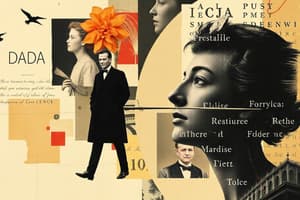Podcast
Questions and Answers
Which literary period is primarily characterized by its emphasis on emotion, imagination, and the idealization of nature?
Which literary period is primarily characterized by its emphasis on emotion, imagination, and the idealization of nature?
- Romantic Period (correct)
- Classical Period
- Victorian Period
- Modernist Period
Which literary device involves the use of objects or characters to represent abstract concepts or ideas?
Which literary device involves the use of objects or characters to represent abstract concepts or ideas?
- Imagery
- Diction
- Symbolism (correct)
- Allusion
Which of the following is NOT considered a primary genre in English literature?
Which of the following is NOT considered a primary genre in English literature?
- Poems
- Plays
- Essays (correct)
- Novels
What is diction in the context of literary devices?
What is diction in the context of literary devices?
Which literary period primarily explored social issues and the impact of industrialization?
Which literary period primarily explored social issues and the impact of industrialization?
Which of these themes is LEAST likely to be frequently explored in English literature?
Which of these themes is LEAST likely to be frequently explored in English literature?
What does the term 'allusion' refer to in the context of literary analysis?
What does the term 'allusion' refer to in the context of literary analysis?
In what way does the study of English literature foster personal growth and understanding?
In what way does the study of English literature foster personal growth and understanding?
Which literary period is known for experimenting with form, structure, and content, often reflecting the social and intellectual changes of the era?
Which literary period is known for experimenting with form, structure, and content, often reflecting the social and intellectual changes of the era?
What is the primary purpose of analyzing a literary work's 'structure'?
What is the primary purpose of analyzing a literary work's 'structure'?
Flashcards
English Literature
English Literature
A diverse collection of written works including poems, novels, and plays that reflect cultural evolution.
Romantic Period
Romantic Period
A time focused on emotion, imagination, and individualism, idealizing nature in literature.
Victorian Period
Victorian Period
A literary era addressing social issues and the rise of the middle class amid industrialization.
Modernist Period
Modernist Period
Signup and view all the flashcards
Figurative Language
Figurative Language
Signup and view all the flashcards
Imagery
Imagery
Signup and view all the flashcards
Symbolism
Symbolism
Signup and view all the flashcards
Themes
Themes
Signup and view all the flashcards
Diction
Diction
Signup and view all the flashcards
Critical Analysis
Critical Analysis
Signup and view all the flashcards
Study Notes
Introduction to English Literature
- English literature encompasses a wide range of written works, including poems, novels, plays, essays, and more
- This diverse body of work reflects the evolution of language, culture, and society
- Studying English literature provides insights into human experiences and perspectives
- It fosters critical thinking and appreciation for different styles and genres
- Understanding how writers utilize language, structure, and imagery enhances communication skills
Historical Periods and Movements
-
Examining literature across different historical periods allows for understanding how societies and cultural values influence creative works
-
Different eras and movements (e.g., Romantic, Victorian, Modernist) are characterized by distinct themes, styles, and concerns
-
Classical Period: Emphasizes reason, order, and balance, often drawing inspiration from Greek and Roman models
- Notable figures include Shakespeare and other playwrights of the Elizabethan Era
-
Romantic Period: Focuses on emotion, imagination, and individualism, often idealized nature
- Notable figures include William Wordsworth and William Blake
-
Victorian Period: Explores social issues, industrialization, and the rise of the middle class
- Notable figures include Charles Dickens and Jane Austen
-
Modernist Period: Experiments with form, structure, and content reflecting social and intellectual changes
- Notable figures include Virginia Woolf and James Joyce
Key Literary Genres
- Novels, poems, plays, and short stories represent core genres in English literature
- Novels: Long prose narratives exploring characters and plotlines in depth
- Poems: Explore a wide range of human experiences, often using figurative language and meter
- Plays: Written for performance on stages, combining dialogue and action to tell a story
- Short stories: explore a single event or conflict in depth
Themes in English Literature
- Frequent recurring themes throughout English literature highlight common human concerns
- Love: A central theme that explores relationships in different forms
- Loss: A pervasive theme that examines grief, sorrow, and absence
- Identity: Explores personal and social identity, self-perception
- Social injustice: A major recurring theme that addresses social inequalities and discrimination
- Nature: often a source of inspiration and reflection, highlighting its beauty and power
Literary Devices
- Writers utilize various techniques to enhance their work, creating meaning and impact
- Figurative language: Includes metaphors, similes, personification, and other devices to create vivid imagery and deeper meaning
- Imagery: Vivid descriptions appealing to the senses to create emotional response
- Symbolism: Use of objects or characters to represent abstract ideas or concepts
- Allusion: References to other works or historical events to enhance meaning
- Diction: Word choice to create tone and atmosphere
- Structure: Organization and arrangement of narrative elements
- Tone: Attitude a work projects, influencing interpretation
Critical Analysis
- Analyzing literary works requires close reading and interpretation, considering various elements, including structure, diction, and themes
- Understanding literary context and historical background provides richer insights into each work
- Evaluating literary merit involves subjective judgments but must be supported by evidence and reasoning.
Studying Literary Periods
- Gaining a solid understanding of different historical periods provides a context for appreciating the writers and their works from that specific period.
- Understanding the social, political, and cultural contexts of the time period is key to interpreting the literature.
Studying That Suits You
Use AI to generate personalized quizzes and flashcards to suit your learning preferences.




